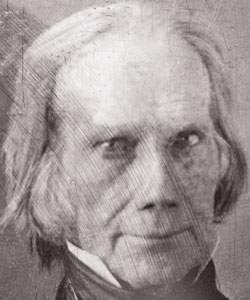Henry Clay (Congressional Biographical Directory)
Reference
CLAY, Henry, (father of James Brown Clay), a Senator and a Representative from Kentucky; born in the district known as “the Slashes,” Hanover County, Va., April 12, 1777; attended the public schools; studied law in Richmond, Va.; admitted to the bar in 1797 and commenced practice in Lexington, Ky.; member, State house of representatives 1803; elected as a Democratic Republican to the United States Senate to fill the vacancy caused by the resignation of John Adair and served from November 19, 1806, to March 3, 1807, despite being younger than the constitutional age limit of thirty years; member, State house of representatives 1808-1809, and served as speaker in 1809; again elected as a Democratic Republican to the United States Senate to fill the vacancy caused by the resignation of Buckner Thruston and served from January 4, 1810, to March 3, 1811; elected as a Democratic Republican to the Twelfth and Thirteenth Congresses and served from March 4, 1811, to January 19, 1814, when he resigned; Speaker of the House of Representatives (Twelfth and Thirteenth Congresses); appointed one of the commissioners to negotiate the treaty of peace with Great Britain in 1814; elected as a Democratic Republican to the Fourteenth, Fifteenth, and Sixteenth Congresses (March 4, 1815-March 3, 1821); Speaker of the House of Representatives (Fourteenth, Fifteenth and Sixteenth Congresses); elected to the Eighteenth and Nineteenth Congresses and served from March 3, 1823, to March 6, 1825, when he resigned; again served as Speaker of the House of Representatives (Eighteenth Congress); appointed Secretary of State by President John Quincy Adams 1825-1829; elected as a National Republican to the United States Senate on November 10, 1831, to fill the vacancy in the term commencing March 4, 1831; reelected as a Whig in 1836 and served from November 10, 1831, until March 31, 1842, when he resigned; chairman, Committee on Foreign Relations (Twenty-third and Twenty-fourth Congresses), Committee on Finance (Twenty-seventh Congress); unsuccessful presidential candidate of the Democratic Republican Party in 1824, of the National Republican Party in 1832, and of the Whig Party in 1844; again elected to the United States Senate and served from March 4, 1849, until his death in Washington, D.C., June 29, 1852; lay in state in the Rotunda of the U.S. Capitol, July 1, 1852; funeral services held in the Senate Chamber; interment in Lexington Cemetery, Lexington, Ky.
"Clay, Henry," Biographical Directory of the United States Congress, 1774 to Present, http://bioguide.congress.gov/scripts/biodisplay.pl?index=C000482.






